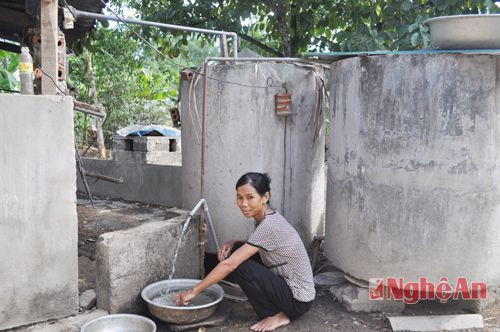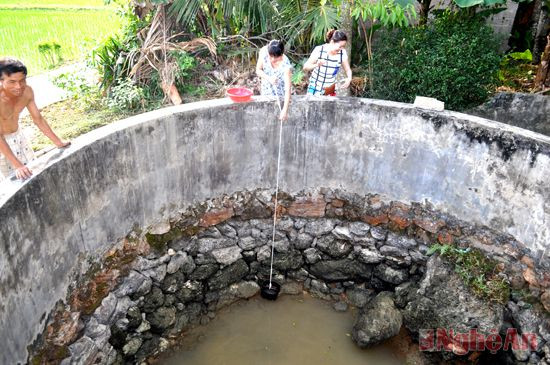Improve life through practical projects
(Baonghean) - The rural clean water and environmental sanitation credit program of the provincial Social Policy Bank has created conditions for tens of thousands of farming households to borrow capital to invest in and build clean water and sanitation works. Although the loan amount is not high, the preferential capital of the State has helped people improve their lives through practical works.
Previously, Ms. Dau Thi Lan's family in Dong Thuong hamlet, Dong Van commune (Thanh Chuong) had a dug well, but the water was yellow and cloudy and unusable. Every day, she had to go to the village well to fetch water for drinking and daily activities. Many days, the well was dry and she had to pour water in buckets, which was very difficult. In the summer, the water source became even scarcer, so every day Ms. Lan had to get up at 4 a.m. to fetch water. Although the village well was located close to the rice fields, the agricultural water source seeped in, the water was cloudy and unclean, but many households in Dong Thuong hamlet still had to use it for daily eating and drinking and daily activities.
 |
| From the loan, Ms. Dau Thi Lan's family (Dong Van commune, Thanh Chuong) has built a clean water project. |
In 2014, Ms. Lan's family received a loan of 12 million VND from the Thanh Chuong District Social Policy Bank to build a clean water project. She invested an additional 20 million VND to drill a well, cast 4 concrete water filters, build a rainwater tank and a sanitation facility. These projects have contributed to improving the family's life. During the recent drought, the clean water source not only served the family's daily life but also provided water for many households in the neighborhood. Ms. Lan shared: "Now we have the conditions to use clean water that is guaranteed to go through 4 clear water filters, washing clothes is no longer stained like before, and for food and drink, there is a rainwater tank. All family members are assured and excited."
 |
| People get unsanitary water for daily use at the well in Dong Thuong village (Dong Van commune, Thanh Chuong). |
The family of Mr. Nguyen Huu Hai in Ngoc Minh hamlet, Thanh Ngoc commune (Thanh Chuong) has just received a loan of 12 million VND from the district's Social Policy Bank to drill a clean water well and build a septic tank. Mr. Hai said: "Up to now, the water source for daily life and drinking of my family has been taken from a well dug in front of the house, but the well is dry, the water source is not clean because water seeps in from the fields. Last year, a survey team came to the locality to check the water source of the dug well, the results showed that most of the well water in this area is contaminated from livestock farming and fallen leaves. My family decided to borrow more capital from the Social Policy Bank to invest in a synchronous septic tank and drill a 35m deep well, buy a water tank to have a clean water source, ensuring the health of the whole family."
Ms. Tran Thi Mai Hanh, Deputy Director of Thanh Chuong District Social Policy Bank, said: Most rural people in the district need to borrow capital to build clean water projects, because people's lives are still difficult. Faced with that reality, for households that do not have clean water projects, or have projects that are not guaranteed, the District Social Policy Bank has created conditions for each household to borrow up to 2 projects, including 12 million VND/household. By the end of May 2015, the outstanding debt of the rural clean water and environmental sanitation loan program reached more than 22 billion VND, with 2,296 households borrowing. With the above loan capital, people in the district have invested in 4,592 clean water and environmental sanitation projects. The credit quality is good, people pay their debts in full and on time, up to now there is only 6.5 million VND of overdue debt.
In the mountainous district of Quy Hop, many communes such as Minh Hop, Tam Hop, Nghia Xuan, Chau Dinh, Van Loi... have difficulty with water sources, people have to drill wells 40 - 60m deep to have water for use. Mr. Nguyen Van Ba, Director of the district's Social Policy Bank, said: The rural clean water and environmental sanitation loan program is extremely necessary for the people of the district. Because in the district there are many units exploiting ores and minerals, the digging process makes the water source turbid and polluted. Therefore, people really need capital to drill wells to ensure the source of water for daily life. By the end of May 2015, the outstanding loan balance for the rural clean water and environmental sanitation program in Quy Hop reached over 21.1 billion VND, with 2,507 households borrowing capital to complete 3,524 works. However, the loan capital only meets 65% of the demand. Although the loan amount has been adjusted to increase from 4 million VND to 6 million VND/project, it is still low compared to the investment needs of the people. Therefore, the people hope that the Government will increase the loan amount to make the people's life easier.
According to data from the Nghe An Provincial Social Policy Bank, by the end of May 2015, the outstanding debt of the rural clean water and environmental sanitation program in the whole province was 430 billion VND, an increase of 50 billion VND compared to 2014, with 48,800 households still in debt. The loan turnover from 2004 to present includes 741 billion VND for all communes in the whole province to borrow capital. Mr. Hoang Son Lam, Head of the Credit Planning Department of the Provincial Social Policy Bank, commented: This is the program with the lowest overdue debt rate among the 12 policy credit programs implemented in the province. Up to now, the total overdue debt of this program in the whole province is only 457 million VND, accounting for 0.106%.
However, the amount of capital lent to households is still low, to complete both clean water and sanitation projects, people have to invest double or triple the amount of capital borrowed. While the lives of people in rural areas, especially in mountainous areas, are still difficult and deprived, the rate of poor and near-poor households is high, so people still have difficulty investing more capital (beyond the amount of loans) to complete clean water and sanitation projects.
Article and photos:Quynh Lan






